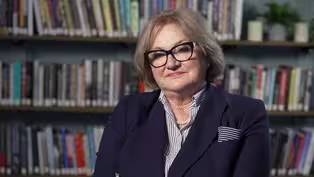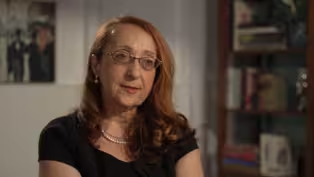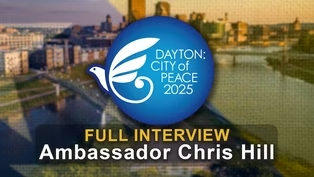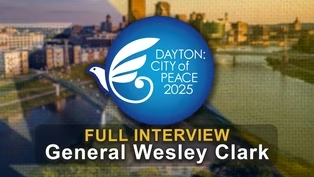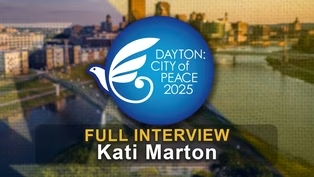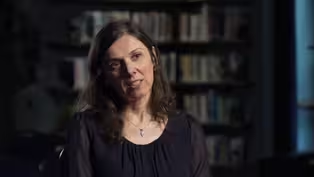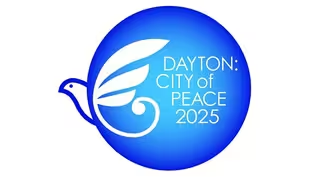
Adnan Secic
Clip: Special | 5m 54sVideo has Closed Captions
Adnan, born in Bosnia and Herzegovina, survived the Bosnian War, before moving to the US.
Adnan, born in Bosnia and Herzegovina, survived the Bosnian War as a soldier and before immigrating to the U.S. with his wife in 1995. Now an engineer in Cincinnati with a master’s in business and a career at GE Aerospace, he’s built a new life rooted in resilience and opportunity.
Problems playing video? | Closed Captioning Feedback
Problems playing video? | Closed Captioning Feedback
ThinkTV Originals is a local public television program presented by ThinkTV

Adnan Secic
Clip: Special | 5m 54sVideo has Closed Captions
Adnan, born in Bosnia and Herzegovina, survived the Bosnian War as a soldier and before immigrating to the U.S. with his wife in 1995. Now an engineer in Cincinnati with a master’s in business and a career at GE Aerospace, he’s built a new life rooted in resilience and opportunity.
Problems playing video? | Closed Captioning Feedback
How to Watch ThinkTV Originals
ThinkTV Originals is available to stream on pbs.org and the free PBS App, available on iPhone, Apple TV, Android TV, Android smartphones, Amazon Fire TV, Amazon Fire Tablet, Roku, Samsung Smart TV, and Vizio.
Providing Support for PBS.org
Learn Moreabout PBS online sponsorship(gentle music) - In 1990s, as a domino effect that socialism and communism fail, so Yugoslavia was also part of that failure, Bosnia was one of the state that was built in ex-Yugoslavia.
Bosnia itself is a multicultural country, and we used to live like peacefully and respect each other.
In 1990s, we used to have first democratic election after the World War II, and national parties actually won the election in Bosnia.
So war started first in 1991 in Slovenia, then transferred to Croatia, (artillery blasting) and then in 1992, started in Bosnia.
The first sign is economy.
When economy collapse, the people behavior is also changing.
There's a struggle, inflation and lots of corruption, but we never thought it's gonna happen, like lead over to the violent breakup.
And so the thing is nationalist, they have their own agenda.
I joined voluntarily to Ministry of Interior, and I was doing my duties.
So as I was trained in Yugoslav Army, I already knew how to use weapon.
Thanks to God I didn't use any, so I was not directly exposed to the frontline or anything, but I was doing like the building protections, and I was active going through the city and helping the people and also helping my families.
People struggle during the war, including tourist.
There's no water, food, electricity.
All communications was shut down.
And then constant snipers and shelling.
In spite that, we still try to mimic some kind of normal life, but many people died.
After the April 6th war started, I started seeing the friends without limbs, arms.
I was gradually thinking, "Yes, the war is happening," and so I heard the people are dying, but when you see the people that you know on the crutches, and so it is really emotional.
I remember one time with my wife, so I asked her the day, and I said, "Listen, I'm gonna come to see you tomorrow.
We are gonna go to coffee bar."
And it was a shelter coffee bar, but let's like just be like normal for two hours, you know?
And then on my way to her apartment, I noticed the coffee bar, coffee shop was closed.
And I said, "Instead of going left, let's do right."
Same distance that we made to the right side to one block down, instead of left, the grenade actually come and kill (blast resonating) about like 10 children.
There was a food shortage in Sarajevo.
We would receive the humanitarian aid.
And this is a lunchbox for the NATO soldier, from US, but this is enough calories for one soldier a day.
Four of us, we had to share this.
So it was not only for one person, it was for four, and we would receive this occasionally.
(shots firing) War lasted close to four years.
In Sarajevo, more than 13,000 people were killed.
1,601 children died.
100,000 people died in Bosnia.
It was difficult, and it was different.
Fortunately, we have cousins that we are really thankful that they help us.
They send us a letter of affidavit here in Cincinnati, and we find the apartment close to the Clifton.
I find a job, first job, at the Spring Grove Cemetery.
I'm very proud of that place, and it's a very nice place.
The Dayton Peace Accord is something, the best thing that could happen to Bosnia at the time, honestly.
To stop the war, that was the major thing.
So everybody were tired, exhausted, in sorrow, and so Bosnia needed peace.
All sides, they needed peace.
That was a priceless.
As the time moved on, the date on Peace Accord stopped the peace, but did not kind of establish the clear directions where the country is gonna go.
So after 30 years, there's still some struggle to make a right progress.
Respect is number one.
Let's respect each other.
So let's build inclusiveness.
Let's build trust.
Let's apply what you learn in healthy way to our country, and everything will be fine.
So no discrimination.
We need to get back to that level.
(gentle music)
Video has Closed Captions
Clip: Special | 6m 27s | Azra, a journalist from Sarajevo, started a successful culinary business in Dayton. (6m 27s)
Video has Closed Captions
Clip: Special | 5m 58s | Dr. Alma, a pediatrician born in Sarajevo, tells her story during the Bosnian War. (5m 58s)
Full Interview: Ambassador Christopher Hill
Video has Closed Captions
Clip: Special | 36m 58s | Amb. Christopher Hill interview, marking the 30th anniversary of Dayton Peace Accords. (36m 58s)
Full Interview: General Wesley Clark
Video has Closed Captions
Clip: Special | 33m 17s | Interview with retired Gen. Wesley Clark on ending the Bosnian War. (33m 17s)
Video has Closed Captions
Clip: Special | 40m 55s | Interview with Kati Marton, widow of Dayton Peace Accords negotiator Richard Holbrooke. (40m 55s)
Video has Closed Captions
Clip: Special | 5m 42s | Meet Irena, an educator whose journey began in Konjic, Bosnia and Herzegovina. (5m 42s)
Dayton: City of Peace 2025 Preview
Video has Closed Captions
Preview: Special | 30s | A new ThinkTV-produced honoring the 30th anniversary of the Dayton Peace Accords. (30s)
Providing Support for PBS.org
Learn Moreabout PBS online sponsorshipSupport for PBS provided by:
ThinkTV Originals is a local public television program presented by ThinkTV
